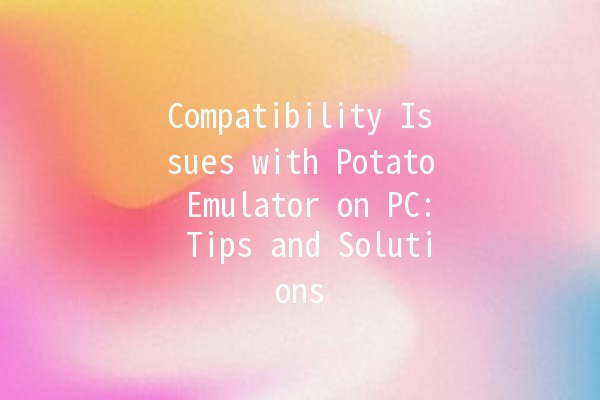In the realm of emulators, the Potato emulator has gained popularity for its ability to run mobile games and applications on PCs. However, many users encounter compatibility issues that can hinder their experience. Whether you are an avid gamer or a developer testing your app, understanding these issues and knowing how to overcome them can significantly enhance your productivity. Here, we’ll delve into the common compatibility problems associated with the Potato emulator on PC and offer practical solutions to improve your overall experience.
Understanding Compatibility Issues
Compatibility issues often arise due to various factors, including hardware specifications, software settings, and the particular application being run. Before diving into solutions, it's crucial to grasp what could lead to these issues:

Hardware Limitations: The performance of the Potato emulator depends heavily on the PC's hardware. Low RAM, inadequate CPU power, or outdated graphics drivers can lead to poor performance or crashes.
Operating System Conflicts: Different versions of Windows or Linux might have specific requirements that need to be met for the emulator to function optimally.
Software Dependencies: The Potato emulator may rely on other software like certain DirectX versions or specific runtime libraries. Missing these can cause compatibility failures.
With this foundation, let's explore five productivityboosting tips to navigate compatibility challenges effectively.
Tip 1: Check System Requirements
Before installing the Potato emulator, ensure your PC meets the necessary system requirements. This step is fundamental as it can save you from frustration and wasted time.
Requirement Checklist:
Operating System: Ensure you're running a supported OS version, such as Windows 10 or above.
RAM: A minimum of 4GB RAM is recommended, but 8GB or more will provide better performance.
CPU: A multicore processor is crucial for smooth emulation.
Graphics: Updated GPU drivers are vital. Check for the latest drivers on the manufacturer’s website.
Example Application
For instance, if your PC only has 4GB of RAM and you plan to run resourceheavy applications, consider upgrading your RAM. This adjustment can drastically reduce lag and improve performance.
Tip 2: Configure Emulator Settings Properly
After ensuring your hardware is adequate, the next step is to adjust the settings within the Potato emulator itself. Correct configurations can significantly improve compatibility and performance.
Suggested Settings:
Graphics Rendering: Switch between OpenGL and DirectX in the emulator settings based on what works better for your system.
Resolution: Lower the resolution and frame rate settings for smoother gameplay, especially on lowerend machines.
Memory Allocation: Adjust the memory settings to allocate more RAM for the emulator.
Example Application
If you experience stuttering during gameplay, try lowering the graphics resolution first. You may find that playing at a resolution of 1280x720 instead of 1920x1080 results in a much smoother experience.
Tip 3: Update Drivers and Software
Keeping your system drivers uptodate is another essential practice. Incompatibility with outdated drivers can cause various problems, including graphical glitches and crashes.
Driver Update Steps:
Example Application
After updating drivers, users frequently report improved performance and stability. If you face freezing issues, this update could resolve them.
Tip 4: Utilize Compatibility Mode
If you're running into problems with specific applications on the Potato emulator, consider using compatibility mode. This feature can help run applications as if they were on older versions of Windows.
Steps to Utilize Compatibility Mode:
Example Application
If a game works flawlessly on an Android device but crashes frequently on the emulator, running the Potato emulator in compatibility mode for Windows 8 may resolve the issue.
Tip 5: Monitor Resource Usage
Keeping an eye on how much of your system’s resources the Potato emulator is using can help you identify bottlenecks causing compatibility issues.
Monitoring Tools:
Task Manager: Use this builtin utility in Windows to see CPU, Memory, Disk, and GPU usage.
Thirdparty Software: Consider tools like MSI Afterburner or HWMonitor for more comprehensive monitoring.
Example Application
If you notice that the CPU usage spikes to 100% when running the emulator, this could indicate that your hardware is struggling to keep up. You may need to close other applications or even consider a hardware upgrade.
Answers to Common Questions
Why is my Potato emulator lagging?
Lagging in the Potato emulator can be attributed to several factors including inadequate hardware, misconfigured emulator settings, and running too many applications simultaneously. Ensure your PC meets system requirements and that the emulator settings are optimized for performance.
Can I run the Potato emulator on a lowend PC?
While it's possible to run the Potato emulator on a lowend PC, the experience may be less than optimal. Focus on minimizing resource usage by lowering graphics settings and closing unnecessary applications to improve performance.
What should I do if Potato emulator won't start?
If the emulator fails to start, check for outdated drivers, missing software dependencies, or incorrect settings. Try reinstalling the emulator or running it in compatibility mode to see if that resolves the issue.
Are there any specific applications that are known not to work well with Potato?
Some resourceintensive applications may struggle on the Potato emulator, particularly those requiring highend graphics performance. It’s advisable to check user forums or official documentation for known issues related to specific apps.
Can I use Potato emulator for resourceheavy games?
Potato emulator may not be the best choice for resourceheavy games. If you aim to play intensive titles, consider using a more robust emulator like LDPlayer or Bluestacks, which may offer better optimization for such games.
How frequently should I update my emulator?
Regularly check for updates to the Potato emulator itself to benefit from improvements and bug fixes. Following official channels will keep you informed about when new versions are available.
, while compatibility issues with the Potato emulator can pose challenges, implementing these tips and solutions can significantly enhance your experience. By understanding the root causes and making necessary adjustments, you can ensure smoother performance and enjoy running your favorite mobile applications on PC.